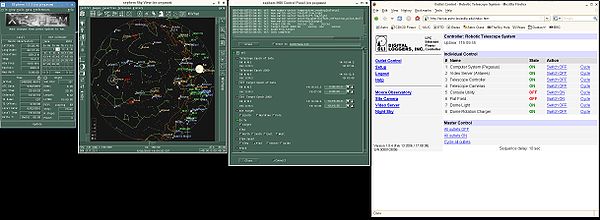Difference between revisions of "Startup"
(Sequence of operations to start an observing session.) |
|||
| Line 41: | Line 41: | ||
6. Log onto the dome computer and check the network connection with a ping offsite if you are running locally. | 6. Log onto the dome computer and check the network connection with a ping offsite if you are running locally. | ||
8. | 8. Use "date" to be sure the local computer time is synchronized by NTP to an atomic clock standard. | ||
7. Create a directory for the daily data: /data/observations/2010mmdd where mm is a two-digit month 01 to 12, and dd is a two-digit day. By convention, this is the local date for sunset at the telescope, not UT. | 7. Create a directory for the daily data: /data/observations/2010mmdd where mm is a two-digit month 01 to 12, and dd is a two-digit day. By convention, this is the local date for sunset at the telescope, not UT. | ||
8. cd /data/observations/2010mmdd/ | 8. cd /data/observations/2010mmdd/ | ||
9. Run "ps -e" and look for the monitordome process which should be already have been started by the computer's startup script. If it is not there, then as root "monitordome &" will start it. | |||
10. If you are not running as "observer", then remove stale tmp files should they exist: "rm /tmp/telcoords". | |||
11. Run "indiserver dome tel ccd guider &" as the observing user, from the data directory. | |||
12. Run "xephem &" as needed for the telescope operator and the observer. | |||
13. xmtel & ; for the observer only | |||
13. xmccd & ; for the observer only | 13. xmccd & ; for the observer only | ||
Revision as of 04:10, 15 June 2010
The remotely operated telescopes run a server that handles communication with the mounting, telescope components, camera, guider, and dome.
Starting the observatory from a total shutdown would follow this sequence:
1. Turn on power to the computer and wait for it to boot up.
2. Turn on power to the video server, telescope field of view camera, guider, and dome interior surveillance camera.
3. Turn on power to the telescope science camera.
4. Turn on power to the telescope mount.
5. Assure that dome power is on to maintain charge on the solar powered battery supply.
6. Log onto the dome computer and check the network connection with a ping offsite if you are running locally.
8. Use "date" to be sure the local computer time is synchronized by NTP to an atomic clock standard.
7. Create a directory for the daily data: /data/observations/2010mmdd where mm is a two-digit month 01 to 12, and dd is a two-digit day. By convention, this is the local date for sunset at the telescope, not UT.
8. cd /data/observations/2010mmdd/
9. Run "ps -e" and look for the monitordome process which should be already have been started by the computer's startup script. If it is not there, then as root "monitordome &" will start it.
10. If you are not running as "observer", then remove stale tmp files should they exist: "rm /tmp/telcoords".
11. Run "indiserver dome tel ccd guider &" as the observing user, from the data directory.
12. Run "xephem &" as needed for the telescope operator and the observer.
13. xmtel & ; for the observer only
13. xmccd & ; for the observer only
Notes
The observer may be logged directly into the telescope computer if the network connection is fast (>> 1 Mbits/sec) with low latency. Otherwise the observer should run software locally and set up tunneling through ssh.
For some testing purposes the hardware may be operated with directly connected software that does not go through INDI. For control of the telescope, camera, dome, and guider these programs are
xmtel1, xmccd1, xmdome1, and xmguide1
They should not be running concurrently with the indiserver versions.
When the server is running the instruments are also open to scripted operation.

